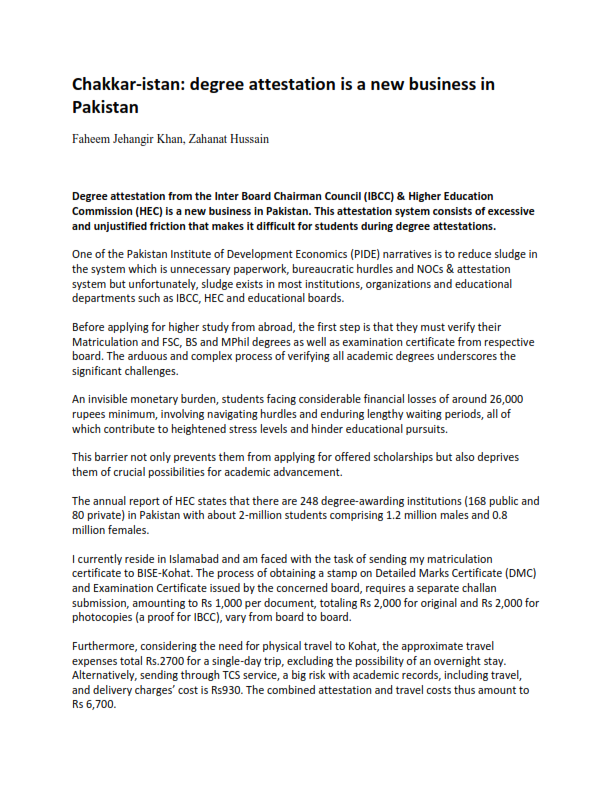Chakkar-istan: degree attestation is a new business in Pakistan
Degree attestation from the Inter Board Chairman Council (IBCC) & Higher Education Commission (HEC) is a new business in Pakistan. This attestation system consists of excessive and unjustified friction that makes it difficult for students during degree attestations.
One of the Pakistan Institute of Development Economics (PIDE) narratives is to reduce sludge in the system which is unnecessary paperwork, bureaucratic hurdles and NOCs & attestation system but unfortunately, sludge exists in most institutions, organizations and educational departments such as IBCC, HEC and educational boards.
Before applying for higher study from abroad, the first step is that they must verify their Matriculation and FSC, BS and MPhil degrees as well as examination certificate from respective board. The arduous and complex process of verifying all academic degrees underscores the significant challenges.
This barrier not only prevents them from applying for offered scholarships but also deprives them of crucial possibilities for academic advancement.
The annual report of HEC states that there are 248 degree-awarding institutions (168 public and 80 private) in Pakistan with about 2-million students comprising 1.2 million males and 0.8 million females.
I currently reside in Islamabad and am faced with the task of sending my matriculation certificate to BISE-Kohat. The process of obtaining a stamp on Detailed Marks Certificate (DMC) and Examination Certificate issued by the concerned board, requires a separate challan submission, amounting to Rs 1,000 per document, totaling Rs 2,000 for original and Rs 2,000 for photocopies (a proof for IBCC), vary from board to board.
Furthermore, considering the need for physical travel to Kohat, the approximate travel expenses total Rs.2700 for a single-day trip, excluding the possibility of an overnight stay. Alternatively, sending through TCS service, a big risk with academic records, including travel, and delivery charges’ cost is Rs930. The combined attestation and travel costs thus amount to Rs 6,700.
The same protocol applies to the verification process for Intermediate; at this time, the degree was from BISE-Peshawar. Accounting for potential travel expenses around Rs 2,200 is required for a single-day trip, or additional arrangements may be needed for an overnight stay alternative is a risky TCS service.
The next step is to visit the IBCC portal for an online appointment, usually a minimum wait of 30-45 days. There is a non-refundable option to pay online, but the process is complicated, students mostly choose physical payment of Rs4,800 (1,200 PKR per document) in the bank to get a fee challan, which consists of both time and financial costs, along with the stress of navigating the queue system at banks.
Only blood-relatives are permitted to process an individual’s attestation. My civic duty is to plan early morning visits with all necessary documents mentioned on the portal readily available. Failure to adhere to these requirements may result in the expiration of allocated time slots. Furthermore, it is essential to emphasize that all degrees must be presented without plastic coating, example are there, many students received documents back while the plastic coating was attested.
Upon entering the IBCC premises, individuals should anticipate a waiting period of approximately 1-2 hours before proceeding to obtain a token through the line system, a further waiting period of 2-3 hours is to be expected for document submission at the attestation window.
If certain documents are found to be missing, arrangements can be made to provide them on the following day; however, it is crucial to note that the appointment letter must be endorsed by the head of IBCC. If a problem arises, individuals may need to schedule another online appointment. It may be noted that the IBCC head usually starts office duties at 10:30 am.
The next day, you have to visit the IBCC office to submit the attested documents. You will join the queue system outside the IBCC premises. There will be another line system, where you will present the assigned token number to receive the original degree and certificate. The same is the process for HEC verification from the online appointment till completely attesting original Bachelor’s and MPhil degrees.
Morally: Attestation of degrees is a significant financial burden for students, costing around 52 billion PKR per annum in Pakistan. One potential solution to this problem is to associate certified academic credentials with a passport or CNIC.
Furthermore, institutes would be responsible for presenting the degrees of an entire graduating batch to the HEC, who would subsequently authenticate them and issue attested copies to the respective students.
To address these systemic challenges, authorities of educational departments and policymakers must work together to prioritize reforms targeted at simplifying procedures, increasing transparency, and reducing the students’ financial and emotional burdens. Only by implementing such reforms will we be able to ensure a smoother and fairer path for students to access educational opportunities abroad while also contributing to the progress of the nation’s human capital and socioeconomic development.




